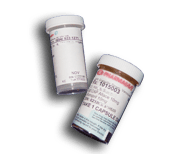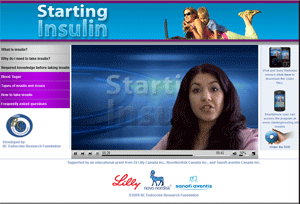Managing Diabetes
If you have been diagnosed with diabetes let’s talk about how you can best manage your diabetes to delay or even prevent the complications. We will go over these items more in detail but there are several points that are very important to state right at the beginning. The first of these is, it is extremely important if you smoke to stop smoking. Secondly, eating healthy foods and getting regular physical activity is important.
Regular blood sugar testing is essential and you should know whether you are achieving the targets your physician has outlined for you. Before eating a meal your sugar level should typically be between 4 and 7 mmols/L. Two hours after eating, the level should be between 5 and 10 mmols/L. The normal non-diabetic blood sugars are typically between 4 and 6 mmols/L before eating and between 4 and 8 mmols/L two hours after eating. It is important to know your blood pressure and whether you are achieving the normal blood pressure target of less than130/80.
To do all of this, you may have to take medications, if prescribed, on a regular basis. It does not mean necessarily that because you need to take a several medications you are sicker. It only means these medications to prevent you from getting sicker. That is the important point. We really want to avoid the long-term complications of diabetes and medications will help you to do it.
It is not difficult
 Healthy EatingEat balanced meals, monitor your blood
sugar after meals and adjust your diet, consult with a nutritionist.
Healthy EatingEat balanced meals, monitor your blood
sugar after meals and adjust your diet, consult with a nutritionist.
 Be ActiveFind what you like to do; the key is burning
any excess calories. Find a way to motivate yourself.
Be ActiveFind what you like to do; the key is burning
any excess calories. Find a way to motivate yourself.
 Medical Therapy
If lifestyle changes
do not control your blood sugar levels, it is time for medication. This is not a
failure.
Medical Therapy
If lifestyle changes
do not control your blood sugar levels, it is time for medication. This is not a
failure.
Tips
- Learn about diabetes and how to manage it.
- Plan your diabetes management program that fits your life, with your healthcare team.
- Monitor your blood sugar on regular bases to understand how your body reacts to your lifestyle and any medication you are taking.
- Analyze your plan every three months based on your A1c results.
- Determine what barriers are getting in the way of you doing your chosen strategy.
- Remember to reduce stress, sleep enough hours, and don’t worry about the occasional blood sugar level highs.
Healthy Eating
People with diabetes cannot secrete enough insulin which is needed when you eat carbohydrates. If the carbohydrate is in the form of sugar, including fruit sugar, it is rapidly absorbed and needs insulin faster. When it is in the form of starch or complex carbohydrates such as bread, rice, or pasta, it also demands insulin secretion but at a slower rate. If you eat a well-rounded diet that includes different food types such as meat or fish, vegetables, milk and other dairy products, as well as carbohydrates, you are able to control the blood sugar better than if your meal is just a large quantity of carbohydrates.
You might want to know how to count the amount of carbohydrates you are eating, as well as the glycemic index. High glycemic index foods cause your blood sugar levels to rise very quickly, overcoming your ability to secrete insulin; you do want to eat lower glycemic index foods. The nutrition expert in your diabetes team will help you make the right food choices. You should ask your physician to refer you to a diabetes teaching centre. It is also wise to learn to avoid eating large amounts of fatty foods. Those with high cholesterol content should be limited and in particular, avoid fried foods and trans fatty acids found in many processed foods. These may make heart disease and high blood pressure more likely.
Physical Activity
Physical Activity also plays an important role in several different ways. Firstly, we know that doing 30 to 45 minutes of walking or other activity every day, or at least every second day, teaches your muscles how to avoid becoming resistant to insulin action. Since this is a major problem in people with diabetes, regular exercise is even more important than for people who don’t have diabetes. It is also true that doing exercise delays the absorption of carbohydrates, and promotes the burning of the carbohydrates by your muscles. If you are overweight, a remarkable benefit can be achieved by losing 5-10% of your total body weight.
Finally, regular activity is also very good to prevent heart disease and high blood pressure. Finding time to be active every day should become a priority for you. Even if you have health problems such as arthritis or diseases that make it hard for you to walk, which is the easiest way to get regular physical activity, you can achieve the same goals by swimming, or by doing resistance exercises even when sitting in a chair by lifting some weights. It has been found that by using a pedometer you can ensure you take 10,000 steps a day and achieve remarkable health.
Medical Therapy
As stated already the first step in treating type 2 diabetes is a healthy diet and daily exercise. Often this is sufficient treatment for many years, but when no longer successful you have to consider taking some pills. There are many different types available. You may need to take only one type of pill, but most people will need to take two or more types. You should not worry if you need to take several different pills, as that does not indicate that your diabetes is worse. Rather, it means that you need to take more to prevent the complications that may come. Taking these pills will make the difference between preventing and not preventing these serious complications which include loss of eyesight, kidney damage and nerve damage including lower extremity amputations, loss of sexual function and of most important, heart disease and strokes.
Finally, taking pills often needs to be supplemented or replaced by taking insulin. Taking insulin is far simpler than it used to be. Injections today are nearly painless, and you may not feel the injection any more than a mosquito bite. So there are many ways to treat your diabetes.
Many people view diabetes as major setback; however it could be a turning point in our lives and we have the choice to decide the path we will take with it. Let it be a wake-up call to a healthier, energetic life.
A life embracing balance, wise food choices and plenty of physical activity is a life well lived. The management of our diabetes can sometimes seem like an overwhelming task. At times like these it is important to take a pause and think about one thing that we know we can do that works. Maybe something as simple as that morning walk that you know makes such a difference and you got out of the habit of doing. Start doing it again. Find time for that walk in your daily routine. Then add another item to your day, perhaps one healthy homemade meal each day.
Build on these positive steps one at a time, and before you know it you will feel the difference in your body and see the difference in your blood sugars. Over time diabetes can change just as our bodies change as we get older. Sometimes it is difficult to stick with our diabetes management program as a result of boredom, or the simple fact that what we are doing is no longer working for us. At times like these we need to be creative and seek alternatives. This may mean alternative foods or activities.
New or different activities can often provide the spark that helps us to feel alive again and sustain the strength that we need to continue to manage our diabetes just as well as ever. Don’t be afraid to seek out guidance if you need it. Guidance can come from a diabetes nurse educator, a dietitian, your doctor, your spouse or a close friend.

Live Well with Diabetes covers Type 2 diabetes definition and diagnosis, management guides, lifestyle change recommendations, medical therapy explanations, information on complications associated with diabetes, blood sugar testing instructions, information links and much more.
Live Well with Diabetes addresses the culture aspects that motivates people to manage their health in Cantonese, Mandarin, Punjabi, Farsi, Arabic, English, French, and Spanish.
Click here to visit Live Well with DiabetesStarting Insulin

Some of us will have to take insulin to control blood sugar, this program will provide
you with detailed information about insulin and how to take it.
Click here to visit Starting
Insulin

Diabetes and My Nation educational videos are specifically developed to meet the cultural aspects of the First Nations.
Click here to Diabetes and My Nation